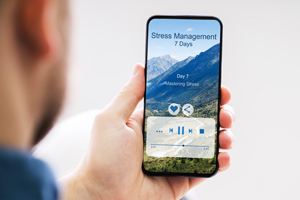Mindfulness Can Help You Manage ADHD at Any Age

Ever wish you could take back impulsively said words or strong reactions during times of stress? One way you can become less reactive is through the practice of mindfulness.
Mindfulness is a practice of becoming aware of the present moment and not reacting emotionally. It can be a helpful tool for individuals of any age in managing ADHD symptoms like emotional dysregulation and stress. In a recent study, participants with ADHD who used a mindfulness app for four months felt calmer and were better able to pause and think before acting.
Mindfulness can support ongoing ADHD treatment as part of your treatment plan. It can help you change problematic thought patterns, build compassion, or strengthen communication. New apps like Headspace, Insight Timer, and Smiling Mind are just some of the many apps that can help those with ADHD to become more aware of emotions, and with practice, become less reactive.
Mindfulness as a supportive tool
“Mindfulness supports many aspects of living with ADHD, starting with managing stress and building resilience–valuable for anyone, but particularly vital around ADHD,” says Mark Bertin, MD, a developmental pediatrician and assistant professor of pediatrics at New York Medical College.
ADHD management requires a lot of persistence and flexible problem-solving, so feeling stressed and overwhelmed makes handling ADHD all that much harder, he says. ADHD affects how a person handles their emotions; using a tool like mindfulness can help them better manage their emotions and improve focus and executive function.
How can you practice mindfulness?
Meditation is one way of practicing mindfulness. Meditation helps you become more aware of your emotions and develop the skill of pausing before acting. It doesn’t mean being silent and having no thoughts. Instead, it involves setting aside time in a quiet space to be more fully aware of your thoughts, not getting hung up on them, and appreciating them as they are.
“The larger premise of mindfulness is that, instead of staying caught up in reactivity and whatever ruts we’ve each learned over time, we can practice building various traits that make it easier to manage our lives,” says Dr. Bertin.
Some people who start a meditation practice may feel like they are not doing it right if they have many thoughts at once or if their mind is not quiet. When starting out, Dr. Bertin recommends letting go of perfectionism or feeling that you aren’t meditating properly. With regular practice you will become more comfortable with meditation.
“Mindfulness doesn’t mean being totally still or without thoughts,” he says. “It’s normal to feel restless and distracted while meditating and doesn’t mean you’re doing anything wrong or are bad at it.”
App features
Free meditation apps like UCLA Mindful and MyLife offer an introduction to meditation for those new to it as well as guided meditations. You can also set up convenient reminders so you remember to practice regularly, and there are some apps that allow users to practice with other people.
The downside to using mindfulness apps is they are self-guided, Dr. Bertin says. With an app, you don’t get the accountability that comes in a therapeutic or class setting. There is no one to hold you to your goal or to check in with you to make sure you are practicing regularly. Practicing mindfulness with a teacher or therapist is better for those with ADHD, he suggests.
“A teacher or therapist can assist with problem-solving when issues arise, and also help in more fully exploring mindfulness as a whole,” says Dr. Bertin. However, the beginning of a good mindfulness practice is to do it consistently. Apps can help you get into the habit. There’s the added benefit that no matter your age, you can benefit from mindfulness.
“The intent of mindfulness is to affect how we are living in the world,” Dr. Bertin says. “Which on a practical level means when we feel more resilient and less reactive, that changes how we communicate and get along with everyone else.”
Interested in more on mindfulness?
- Mindfulness, ADHD, and Managing Emotions
- Find Your Own Way to Practice Mindfulness
- Mindfulness helps some people manage ADHD
Join the discussion: Do you use any apps or other tools to help you practice mindfulness?
